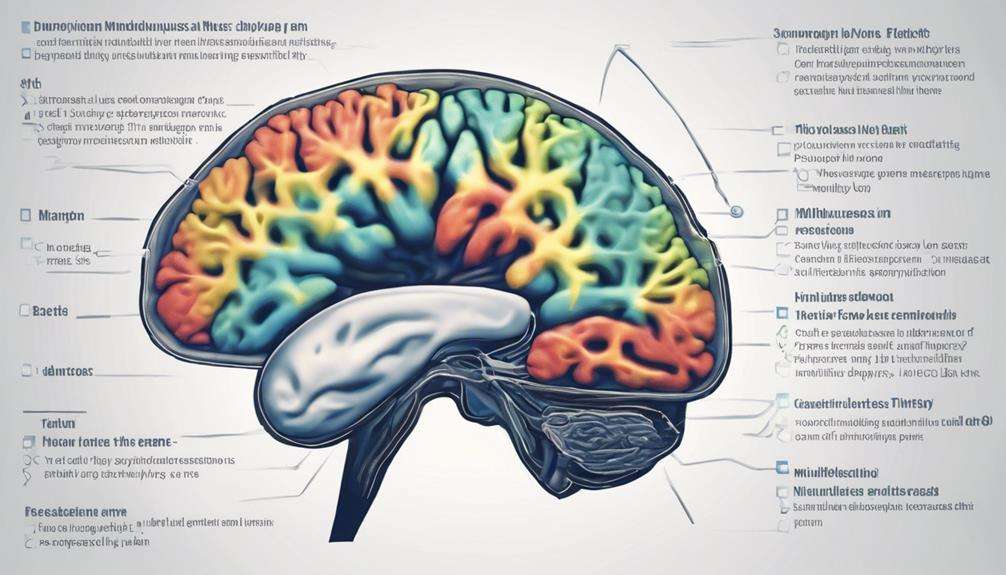Imagine chronic pain as a relentless storm, each wave crashing against your shore, unyielding and unceasing. Now, picture mindfulness practices as a sturdy lighthouse, guiding you through the tumultuous waters with calm and clarity.
But why is this beacon of mindfulness so crucial in your journey with chronic pain? The answer lies in the profound impact it can have on reshaping your relationship with pain and empowering you to navigate the complexities of your experience.
Key Takeaways
- Mindfulness practices reduce pain perception and improve quality of life.
- Non-judgmental attitude enhances coping strategies for chronic pain.
- Mindfulness aids in reducing reliance on pain medications.
- Integrating mindfulness techniques fosters mental resilience and emotional well-being.
Understanding Mindfulness and Chronic Pain
Have you ever wondered how mindfulness can play a crucial role in understanding and managing chronic pain?
Mindfulness practices offer a unique approach to pain management, focusing on non-elaborative awareness of the present moment. This method is particularly beneficial for individuals facing chronic pain, which affects millions globally. Research indicates that mindfulness meditation can help reduce the perception of pain and enhance overall quality of life for those living with chronic pain conditions. By developing a non-judgmental attitude towards their pain, individuals can improve their coping strategies and reduce the impact of pain on their daily lives.
Furthermore, the Centers for Disease Control and Prevention (CDC) recommend mindfulness as a nonpharmacological approach to managing chronic pain. This endorsement underscores the significance of incorporating mindfulness techniques in pain management strategies. Embracing mindfulness not only aids in alleviating physical discomfort but also fosters mental resilience and emotional well-being. By integrating mindfulness into their daily routines, individuals can cultivate a healthier relationship with their pain and enhance their overall quality of life.
Benefits of Mindfulness for Pain Management
Mindfulness practices offer tangible benefits for individuals managing chronic pain, including reducing pain perception and enhancing overall well-being. When it comes to pain management, incorporating mindfulness into your daily routine can make a significant difference in how you experience and cope with pain. Here are some specific benefits of mindfulness for pain management:
- Reduced Pain Perception: Regular mindfulness practice has been shown to decrease the perception of pain in chronic pain patients, providing relief and comfort.
- Less Reliance on Pain Medication: Some individuals have successfully reduced or even eliminated the need for pain medication through consistent mindfulness meditation interventions, offering a natural alternative for pain management.
- Managing Negative Thoughts: Mindfulness exercises help you focus your mind and body without judgment, assisting in managing the negative thoughts associated with pain and promoting a more positive mindset.
- Improved Overall Well-being: Daily mindfulness practice aids in managing the psychological aspects of chronic pain, leading to an improvement in quality of life and overall well-being.
Importance of Mindfulness Practices

Engaging in mindfulness practices can be a transformative experience for managing chronic pain effectively.
These techniques, such as mindfulness meditation, have been scientifically proven to reduce pain perception and enhance overall well-being.
Benefits of Mindfulness
How can practicing mindfulness benefit individuals dealing with chronic pain?
Mindfulness offers a range of benefits that can significantly impact your pain management journey:
- Reduced Perception of Pain: By engaging in mindfulness practices, you can lessen your subjective experience of pain, leading to improved overall well-being.
- Decreased Brain Activation: Mindfulness has been shown to lower brain activation in areas associated with pain processing, potentially reducing the intensity of your discomfort.
- Pain Medication Reduction: Some individuals have successfully decreased or eliminated their reliance on pain medication through consistent mindfulness practice.
- Managing Negative Thoughts: Mindfulness exercises help you cultivate a non-judgmental awareness, assisting in coping with the negative thoughts often accompanying chronic pain.
These benefits underscore the importance of integrating mindfulness into your pain management strategy.
Techniques for Practice
Transitioning from understanding the benefits of mindfulness for chronic pain, let's now explore effective techniques that can be employed to integrate mindfulness practices into your daily routine.
Engaging in mindfulness meditation, such as deep breathing exercises and body scans, can help you focus on the present moment and reduce the stress associated with chronic pain. Through regular mindfulness practice, you may experience improvements in pain intensity and coping mechanisms over time.
These techniques aid in promoting self-awareness and acceptance of pain without judgment, enhancing emotional well-being in pain management. By fostering the brain's pain-regulating regions, mindfulness offers a holistic approach to chronic pain by addressing both the physical and emotional aspects of pain perception.
Embrace mindfulness as a tool for pain acceptance and management in your daily life.
Mindfulness Techniques for Pain Relief
When dealing with chronic pain, you can start exploring mindfulness techniques like focused breathing, body scans, and mindful movement exercises. These practices have been proven to help reduce the intensity of pain and enhance your ability to cope with it over time.
Breathing for Pain Relief
Wondering how mindful breathing can alleviate chronic pain and promote relaxation for improved pain management strategies? Here's how it works:
- Activating the Relaxation Response: Mindful breathing triggers the body's relaxation response, lowering stress levels.
- Decreasing Pain Perception: Deep breathing techniques in mindfulness reduce how pain is felt.
- Enhancing Pain Tolerance: Regular practice of focused breathing can improve your ability to cope with pain.
- Improving Oxygen Flow: Mindful breathing enhances oxygen circulation, aiding in relaxation and reducing muscle tension.
Body Scan Technique
To deepen your understanding of mindfulness techniques for pain relief, let's explore the body scan technique. This practice involves systematically focusing on different parts of your body to increase awareness and promote relaxation.
By engaging in this mindfulness practice, individuals can observe physical sensations without judgment, fostering a sense of relaxation and acceptance. Research indicates that regular body scan practice can reduce pain perception and enhance overall well-being for those experiencing chronic pain.
This technique helps release tension, improve body awareness, and facilitate stress reduction by directing attention to specific body areas. Incorporating the body scan into your daily mindfulness routine can enhance pain management strategies and strengthen the mind-body connection, offering holistic relief for chronic pain sufferers.
Mindful Movement Exercises
Engaging in mindful movement exercises, such as yoga and tai chi, offers chronic pain patients a holistic approach to improving flexibility, reducing discomfort, and enhancing overall well-being. These exercises promote body awareness, relaxation, and gentle stretching to alleviate muscle tension and discomfort.
Here's why mindful movement exercises are essential for chronic pain patients:
- Enhance flexibility and reduce pain.
- Promote body awareness and relaxation.
- Alleviate muscle tension through gentle stretching.
- Improve pain management and physical function.
Research supports that incorporating mindful movement into your daily routine can decrease pain intensity, increase mobility, reduce stiffness, and enhance overall physical function. Start reaping the benefits of mindful movement exercises today for better pain relief and improved quality of life.
Mindfulness Meditation for Chronic Pain
Incorporating mindfulness meditation into your daily routine has been shown to significantly reduce the perception of chronic pain and improve overall pain management. Research conducted by Fadel Zeidan, Ph.D., indicates that mindfulness meditation can lead to decreased brain activation in regions associated with pain management.
Many individuals have reported successfully reducing or even ceasing their use of pain medication by engaging in daily mindfulness meditation practices. By focusing the mind and body without judgment, mindfulness meditation helps individuals manage the negative thoughts often linked to chronic pain.
Furthermore, the daily practice of mindfulness meditation can be instrumental in alleviating symptoms of stress, anxiety, and depression, which commonly accompany chronic pain. Embracing mindfulness meditation as a regular part of your routine may offer a holistic approach to managing chronic pain and improving your overall well-being.
Neurophysiological Impact of Mindfulness

Pain modulation through mindfulness practices involves a profound impact on specific brain regions associated with cognitive and emotional pain processing. The neurophysiological basis of mindfulness in pain modulation is crucial for understanding its efficacy.
- Anterior Cingulate Cortex (ACC) and Prefrontal Cortex (PFC): Mindfulness practices influence these brain regions, which are crucial for processing pain signals and regulating emotional responses.
- Cognitive Factors: Expectations, conditioning, and mood can either amplify or attenuate pain perception through mindfulness, highlighting the role of cognitive processes in pain modulation.
- Endogenous Opioidergic Systems: Unlike traditional pain relief methods, mindfulness meditation doesn't rely on these systems to reduce pain, offering a unique approach to managing chronic pain.
- Neural Processes: Various neural mechanisms are engaged during mindfulness meditation to reduce pain, surpassing mere placebo effects and enhancing the clinical acceptance of mindfulness in pain management.
Understanding these neural processes can pave the way for more effective pain management strategies that integrate mindfulness practices.
Incorporating Mindfulness Into Pain Management
Utilizing mindfulness techniques in pain management has shown notable efficacy in improving quality of life for individuals enduring chronic pain conditions. By incorporating mindfulness practices such as meditation and deep breathing into your pain management routine, you can effectively reduce the perception of pain and enhance emotional well-being. These mindfulness interventions help shift your focus away from pain sensations, enabling you to cope better with discomfort and improve your overall quality of life.
Research indicates that mindfulness practices offer a non-pharmacological approach to chronic pain relief, decreasing pain intensity and potentially reducing the need for medication. By actively engaging in mindfulness techniques, you empower yourself to take control of how you experience and respond to chronic pain, ultimately leading to improved well-being and a more positive outlook on managing your condition. Embracing mindfulness in your pain management regimen can be a powerful tool in your journey towards better health and enhanced quality of life.
Frequently Asked Questions
Why Is Meditation Good for Chronic Pain?
Meditation is good for chronic pain as it aids in pain management, stress reduction, and emotional well-being. It enhances the mind-body connection, promotes relaxation techniques, and offers pain relief through breath and body awareness, fostering self-compassion and cognitive therapy.
What Are the 5 Coping Skills Every Chronic Pain Patient Needs?
You need breathing exercises, physical therapy, support groups, relaxation techniques, and cognitive behavioral therapy to cope with chronic pain. These tools help manage pain, reduce stress, improve mood, and enhance your quality of life.
How Does Mindfulness Reduce Suffering?
Mindfulness reduces suffering by enhancing the mind-body connection, regulating emotions, and reframing pain perceptions. Through mindful breathing and self-awareness, it boosts pain tolerance, reduces stress, and harnesses neuroplasticity effects, offering transformative benefits in pain management.
How Do You Manage Mental Health With Chronic Pain?
To manage mental health with chronic pain, remember cognitive strategies, support groups, stress reduction, therapy options, relaxation techniques, emotional regulation, self-care practices, communication skills, mind-body connection, and a positive mindset. These tools can aid in your holistic well-being.
Conclusion
You may have never thought that simply focusing your mind could have such a powerful impact on managing chronic pain.
By incorporating mindfulness practices into your daily routine, you can experience a significant reduction in pain perception, improved quality of life, and decreased reliance on medication.
The evidence is clear – mindfulness isn't just a trend, but a proven and essential tool for those dealing with chronic pain.
Give it a try and see the difference for yourself.






